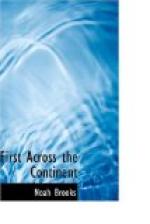The journal of the explorers gives this interesting account of the Indians among whom they now found themselves:—
“The Chopunnish or Pierced-nose nation, who reside on the Kooskooskee and Lewis’ (Snake) rivers, are in person stout, portly, well-looking men; the women are small, with good features and generally handsome, though the complexion of both sexes is darker than that of the Tushepaws. In dress they resemble that nation, being fond of displaying their ornaments. The buffalo or elk-skin robe decorated with beads; sea-shells, chiefly mother-of-pearl, attached to an otter-skin collar and hung in the hair, which falls in front in two cues; feathers, paints of different kinds, principally white, green, and light blue, all of which they find in their own country; these are the chief ornaments they use. In the winter they wear a short skirt of dressed skins, long painted leggings and moccasins, and a plait of twisted grass round the neck. The dress of the women is more simple, consisting of a long shirt of argalia (argali) or ibex (bighorn) skin, reaching down to the ankles, without a girdle; to this are tied little pieces of brass, shells, and other small articles; but the head is not at all ornamented.
“The Chopunnish have very few amusements, for their life is painful and laborious; all their exertions are necessary to earn even their precarious subsistence. During the summer and autumn they are busily occupied in fishing for salmon and collecting their winter store of roots. In winter they hunt the deer on snow-shoes over the plains, and toward spring cross the mountains to the Missouri for the purpose of rafficking for buffalo-robe. The inconveniences of their comfortless life are increased by frequent encounters with their enemies from the west, who drive them over the mountains with the loss of their horses, and sometimes the lives of many of the nation.”
After making a short stage on their journey, October 11, the party stopped to trade with the Indians, their stock of provisions being low. They were able to purchase a quantity of salmon and seven dogs. They saw here a novel kind of vapor bath which is thus described in the journal:—
“While this traffic was going on we observed a vapor bath or sweating-house, in a different form from that used on the frontier of the United States or in the Rocky Mountains. It was a hollow square six or eight feet deep, formed in the river bank by damming up with mud the other three sides and covering the whole completely, except an aperture about two feet wide at the top. The bathers descend by this hole, taking with them a number of heated stones and jugs of water; after being seated round the room they throw the water on the stones till the steam becomes of a temperature sufficiently high for their purposes. The baths of the Indians in the Rocky Mountains are of different sizes, the most common being made of mud and sticks like an oven, but the mode of raising




